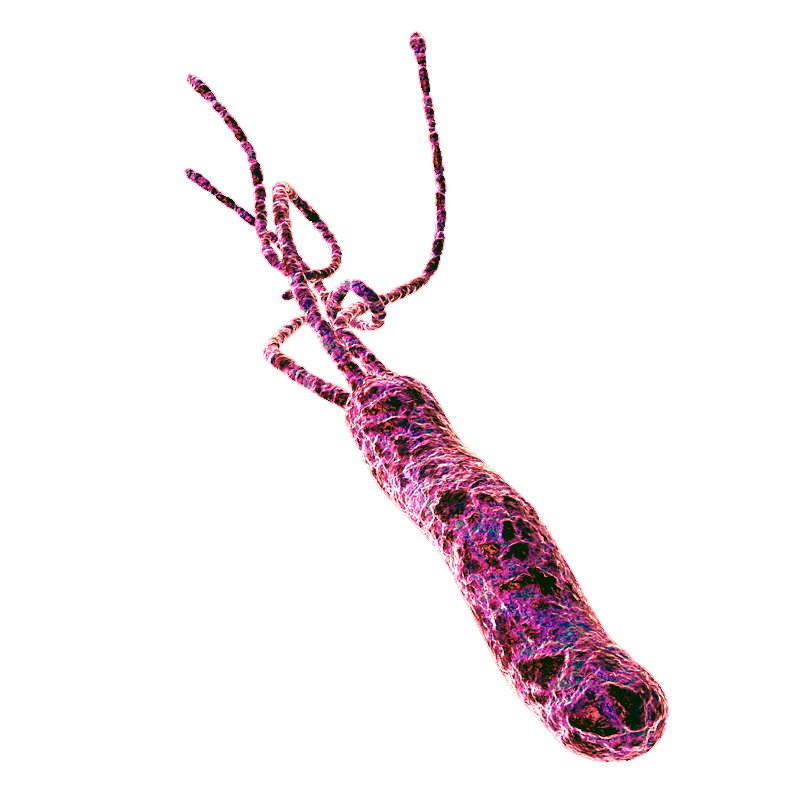Dull pain in the stomach, nausea, vomiting, bloating, burping, and/or acid reflux. These symptoms may sound familiar to you if you have ever had the pleasure of experiencing a stomach ulcer, which is a sore in the lining of the stomach or small intestine. The stomach contains gastric juices, also known as stomach acid, for effective digestion of food. Stomach acid is very acidic, and so the epithelial tissue of the stomach is covered with a thin layer of mucous that lines and protects these cells from coming into contact with stomach acid. While you sit there and eat that donut, the mucous lining of your stomach protects your stomach acid from eating you. When this mucous layer becomes thinner, the gastric juices come into contact with the epithelial tissue in the stomach, causing an inflammatory response, potentially leading to a stomach ulcer.
Okay, so what is causing the mucous lining to become thinner? Well, one culprit is actually a bacterium that can live in our stomachs called Helicobacter pylori (and no it is not named after helicopters, but rather after the helical shape they have. I know, I was disappointed, too). Half of the world’s population is infected with H. pylori. H. pylori inhabits the stomachs of infected individuals, many of whom will never experience symptoms from an infection. However, after many years of an H. pylori infection, some individuals may develop an ulcer.
BUT WAIT. Didn’t I just mention that the stomach environment is so acidic that we need a mucous lining to protect our own cells? How can H. pylori live there if it’s so acidic?! Well, the bacterium is cleverly able to protect itself from our gastric juices by living in the mucosal lining and secreting urea, allowing it to avoid stomach acid. (There are actually other bacteria that are able to live in our stomachs, too!). Living in the mucosal lining, H. pylori is also able to avoid other potential defense mechanisms our body uses to protect us from bacterial infections, thus leading to why the infection can last for years. While living in the mucosal lining, H. pylori can cause the lining to thin in certain areas overtime.
Diagram of gastric ulceration by H. pylori by Y tambe. CC License 3.0.
What does H. pylori have to do with cancer?
Cancer is the generic term used to describe diseases where the body’s cells essentially begin to divide and have a mind of their own. These cancer cells become distinct from the normal cells in our body. Cancer in the stomach, referred to as gastric cancer, is the second most common cause of death for individuals with cancer. Chronic infections in the stomach caused by H. pylori, such as ulcers, can turn into cancer. In 2015, researchers found that H. pylori is able to interact with stem cells in the stomach, causing them to divide more rapidly. Rapid and uncontrolled division of such stem cells can lead to the development of a tumour and result in cell invasion into nearby tissues. The stem cells in our stomach live for much longer than regular stomach cells, giving H. pylori the time to cause negative changes and allow the stem cells to develop the hallmarks of cancer. As a result of what the bacterium can do to our bodies, H. pylori is often referred to as a bacterial carcinogen.
Helicobacter pylori by AJC1. CC License 2.0.
Is there any way to stop H. pylori from causing cancer?!
Have no fear, the pharmaceutical industry is here! Various treatments exist and even more are being developed for stomach ulcers caused by H. pylori. Many current treatments include the use of proton pump inhibitor drugs to decrease stomach acid and allow for an ulcer to heal, as well as treatment with an antibiotic to kill the H. pylori bacteria. Effective treatment against an H. pylori infection decreases the risk and incidence of H. pylori caused gastric cancers. With proper treatment of a stomach ulcer, you can be back on your way to eating that donut with the epithelial cells of your stomach protected from your gastric juices. If you have never had a stomach ulcer, I think you should take a second to appreciate mucous lining your stomach, because I can tell you from experience that they are not fun.
 Pills by Victor. CC License 2.0.
Pills by Victor. CC License 2.0.
As mentioned earlier, many people live with H. pylori infections around the world, however, unless there are symptoms of a stomach ulcer or other gastrointestinal infections, an individual will never really know if they have H. pylori. Either way, preventative measures should be taken to protect yourself from an H. pylori infection. In addition, recognizing the signs and symptoms of an ulcer may also help an individual and their healthcare professional detect and treat an infection in a timely manner. As always, if you have any questions about your health and a potential H. pylori infection, please contact or visit your family physician.
Additional Reading: How H. pylori was discovered as a cause for stomach ulcers
In 1984, a physician drank a broth filled with H. pylori and gave himself an ulcer to know once and for all if the bacteria really did in fact cause ulcers. While this sounds really crazy, him and his colleague did win a Nobel Prize for their research with H. pylori. Click here to read more about this amazing discovery.



Recent Comments